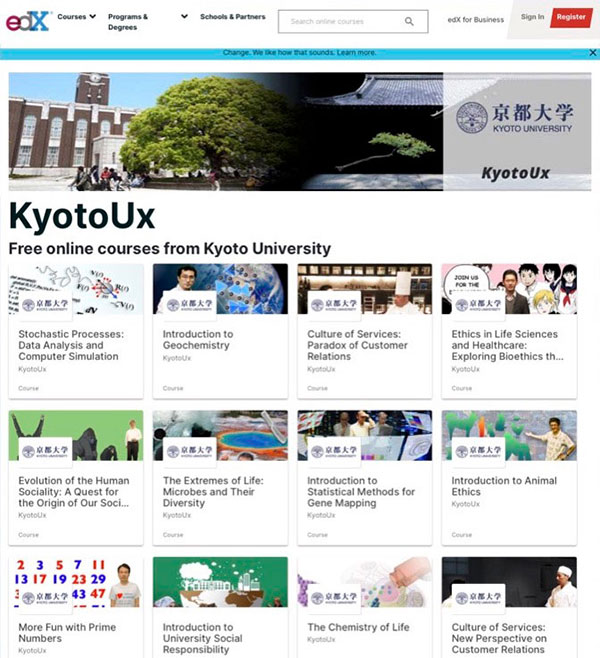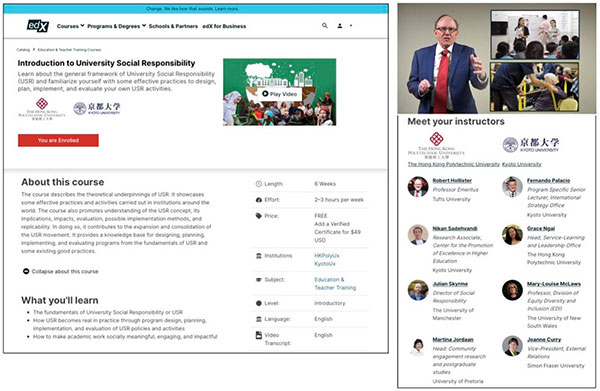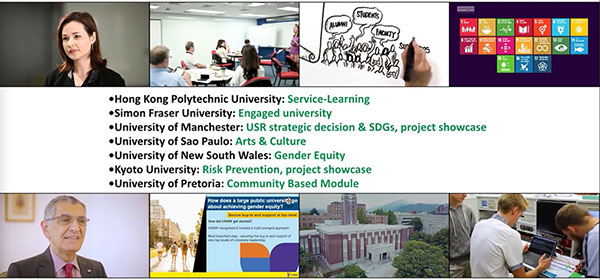30th JAMCO Online International Symposium
February 2022 - March 2022
For a Sustainable World – Responses to the COVID-19 Crisis
Promoting International Educational Collaboration with MOOCs: The Case Study of the University Social Responsibility Network
Universities and other educational institutions around the world have been making increasing use of MOOCs (Massive Open Online Courses) for more than a decade. These MOOCs have had a big impact on higher education by reaching beyond the boundaries of traditional university lectures to connect multiple universities and establish new formats for global education. More than 16,000 MOOCs were offered at the end of 2020. In this lecture, I will present the example of a MOOC, an ‘Introduction to University Social Responsibility’, hosted by Kyoto University and the Hong Kong Polytechnic University and produced and disseminated with the cooperation of five other universities. This MOOC had the aims of identifying new possibilities for international educational collaborations through online educational media, and assessing what new social roles and contributions higher education can realize by these means.
MOOCs and the Global Dissemination of Open Education
Universities, private companies, and other organizations, overseas, especially, began the active expansion of ICT use in higher education and educational innovation before the COVID-19 pandemic. The global dissemination of the Internet, which began in the mid-1990’s, made online lectures and the distribution and sharing of educational materials possible, and introduced new formats of e-learning to the world of higher education. Massachusetts Institute of Technology (MIT) fomented a sensation not only among other universities but also in society at large by placing videos of its lectures and study materials online as open course work (OCW) in 2001, and the open education movement then spread rapidly from North America around the world.
The MOOC concept of the Massive Open Online Course emerged from this trend in the early 2010’s as a test conducted at Stanford University. The idea spread rapidly and has gone global during the past few years. A report by Class Central of the United States counted about 16,300 such courses offered by 950 universities as of the end of 2020.
International Collaboration between Universities using MOOCs and other Online Education
Many students intending to study abroad have had to postpone or cancel their plans due to the COVID-19 pandemic. This crisis has drawn fresh attention to MOOCs and other forms of online education as ways students to study virtually in a foreign university. The Delft University of Technology (TU Delft) in the Netherlands, for example, has linked with over ten universities worldwide in its Virtual Exchange Program. This program provides more than ten credit-bearing courses for all the participating universities. Arrangements of this kind are now globally spreading among the universities. The Collaborative Online International Learning (COIL) project launched to forge links and promote cooperation between universities by the State University of New York consists of the partial online sharing of courses from participating universities around the world, including here in Japan. Today, about 90 universities have joined the COIL Global Network, under which universities do not need to engage in mutual course accreditation agreements. The long-distance lectures are provided in real time and on-demand using LMS, MOOC and other such systems. This versatile approach has done much to propel the global spread of online university education during the pandemic, and the further acceleration of the globalization of university education is expected.
Promoting New International Cooperation between Universities with MOOCs
The Kyoto University’s Center for the Promotion of Excellence in Higher Education, of which the author serves as the director, links up with the SGU and other projects for all faculties to disseminate courses globally via MOOCs, open courseware, etc. Kyoto University’s MOOCs were launched through edX in 2014 and provide online lectures in English. The Open edX MOOC platform under this system is open source with free access. Kyoto University also provides, using the Open edX on its own server,SPOCs (Small Private Online Courses) in Japanese both for the its own students and other learners. Furthermore, some lectures are provided for additional distribution, mostly in Japan, using JMOOC/Gacco.
Currently, 14 courses are offered as global MOOCs under KyotoUx, Kyoto University’s edX brand, covering a wide range of subject areas, including mathematics, physics, management, biochemistry, medical statistics, geochemistry, primatology, and ethics. The faculty members of research universities tend to be more interested in, and excited by, research than teaching, but increasing numbers have been intrigued by the international teaching opportunities and contributions made possible by MOOC and other online systems. They, in turn, provide a good impetus and model for other instructors to follow.

Figure 1. Kyoto University’s Global MOOC website “KyotoUx”
Kyoto University and the Hong Kong Polytechnic University commenced distribution of the Introduction to University Social Responsibility MOOC in February, 2020. University Social Responsibility (USR) corresponds to the Corporate Social Responsibility (CSR) of private companies and concerns the concepts and principles of the social contributions that universities make through education and research. This MOOC is a joint USR Network (http://www.usrnetwork.org) project for disseminating knowledge and promoting understanding of USR through the introduction of examples implemented by universities around the world. The Kyoto University’s Center for the Promotion of Excellence in Higher Education has been managing and producing this MOOC in cooperation with the USR Network headquarters based at the Hong Kong Polytechnic University.
Centered in this manner on the Hong Kong Polytechnic University, the USR Network (hereinafter, USRN) was launched in 2015 as an inter-university network for the active promotion of USR, on the principle that universities had the responsibility to tackle and seek solutions to global economic, societal, cultural, environmental and other problems together. Nineteen universities currently participate from such countries and territories as Hong Kong, China, Japan, Britain, Brazil, the United States, Australia, Israel and South Africa. Its core activities include the provision of community-based education programs for students, observation and research programs for teaching and administrative staff, disaster-reduction activities, the publication and electronic distribution of USR-related materials, and the USR Summit.
USRN is a collaborative global network of universities which, sharing this same vision, seeks in the field of higher education to promote their universities’ closer engagement with society. The USRN member universities believe they must step out from the ivory tower and reform themselves for the general good. Their aim is to pay back more to society by tackling its economic, societal and environmental challenges together and, in these ways, make the world a fairer, more inclusive place of sustainable peace. Kyoto University, as a USRN founder, is a core member of the network alongside the Hong Kong Polytechnic University and has made continuing contributions to its development and growth. Kyoto University proposed this MOOC project to USRN and the MOOC has been implemented with the Hong Kong Polytechnic University’s cooperation.

Figure 2. MOOC “The Introduction to University Social Responsibility”
Aims and Content of the Introduction to University Social Responsibility MOOC
The MOOC is distributed jointly by KyotoUx (Kyoto University) and PolyUx (Hong Kong Polytechnic University) through edX for the leaders, stakeholders, teachers and students of each university to learn about USR from examples of good practice compiled from universities all over the world, and encourage all to participate in this global movement. The content consists of a 4-week course and special session on how universities have responded to COVID-19. This content explains the general USR concept together with outstanding measures and projects that USRN member universities have undertaken to bring positive change in society. The seven examples from universities around the world presently introduced on the MOOC are as follows:
- Simon Fraser University in Canada has placed community engagement at the core of its strategic vision and, in order to make the university a forum of public dialogue, convenes an annual, week-long community summit for members of the local community.
- The Hong Kong Polytechnic University in Hong Kong has made Community Service Learning a compulsory subject for all 16,000 first degree students. This course also places strong emphasis on international contributions.
- The University of Pretoria in South Africa has implemented a social contribution program with assistance from the growing network. A team of more than ten teaching and NGO staff members is engaged in its planning and implementation.
- The Kyoto University Disaster Prevention Research Institute of Japan makes use of its expertise in natural and manmade disaster prediction and relief, providing educational activities for students with the aim of disseminating knowledge and enhancing disaster reduction activities in the local community, across Japan, and worldwide.
- The University of New South Wales in Australia provides preparatory education for student volunteers and pioneering guidelines for improving the quality and enhancing the educational results of students’ voluntary activities.
- The University of São Paolo in Brazil emphasizes societal contribution through cultural activities. It manages cultural facilities and groups directly, holds art and other training activities in cultural fields for members of the general community, and hosts various events.
- At the University of Manchester in Britain, a specially appointed Vice-President for Social Responsibility and director promote and give wide-ranging support to USR activities across all faculties for the university to make a sustained commitment to social contribution.

Figure 3. Cases from the Universities
The MOOC also provides information on effective and practical ways to plan and implement social contribution projects through the educational activities of the university. The special session addresses various issues raised by the pandemic and introduces a wide range of responses implemented by these universities.
Who has Enrolled and their Satisfaction with the Courses
Analysis of the MOOC’s registration records, questionnaires completed after finishing the courses, background data on the first students to use the MOOC in February and March, 2021 (N=248), etc., reveals a gender ratio of 54.4% female to 45.6% male; by age, 13% of users were 25 or younger, 35.2% aged from 26-40, and 51.9% were 41 or older; by educational level, 9.2% had completed upper secondary education, 21.3% held a bachelor’s degree or the equivalent, 38.9%, a master’s degree, and 30.6%, a doctorate. The larger number of older users and higher educational level compared with MOOCs for ordinary university or graduate school courses reflected the fact that this MOOC is intended for use in professional USR development by university leaders, stakeholders, teaching staff, etc., indicating that these target groups did indeed account for the bulk of users. By country and region, the top ten locations of users were, in descending order, Japan, the United States, Mexico, Hong Kong, South Africa, Australia, Canada, France, the UK, and Indonesia.
Regarding satisfaction levels, 75% declared themselves highly satisfied, and 12.5%, satisfied. 70.8% responded they would make use of things learned on this MOOC in their own work. 79.2% said the MOOC would be useful for them in the design and implementation of systems and activities for promoting USR at their own university. The MOOC was thus accorded high acclaim in terms of both satisfaction and usefulness.
Proposals for the Promotion and Expansion of Social Contributions through the Globalization of Higher Education
Chan, Hollister, Iiyoshi, & Lloyd (2020) have made five proposals relating to international USR and service learning through the dissemination and sharing of this MOOC, as follows:
- 1. To establish what students should be taught and how on the basis of the evidence of real academic achievement relating to USR and service learning.
- 2. As a part of USR, to promote the building and implementation of systems that strengthen ties between universities and private corporation, for operation in such fields as environmentally-friendly construction design and the promotion of consumer activity that invigorates local economies.
- 3. To expand international service learning projects that transcend the particular locations and cultures of the students.
- 4. To promote USR and service learning activities that particularly address the United Nations’ sustainable development goals (SDGs).
- 5. Through active international communication, to achieve USR social contributions that reach beyond the stakeholders of higher education.
The COVID-19 pandemic has already triggered a wider dissemination of online university lectures, and the further acceleration of the globalization of university education using MOOCs and other forms of online education is anticipated. In Japan, unfortunately, the main response of universities to the pandemic has been to swing between direct and online or hybrid teaching according to the domestic COVID situation. Regarding higher education for the post-COVID era, however, the best use of diverse teaching methods must be tailored and optimized according to broader purposes and needs. There is an urgent requirement upon universities, actively and strategically, to address and discover solutions for not only their own direct challenges, but also the challenges now facing the world. MOOCs provide an unconstrained, free-ranging tool for achieving these ends.
References (documents and websites):
- Toru Iiyoshi ‘Prospects for Higher Education in the Year 2050: Possibilities and Challenges for Promoting Uses of Educational ICT at Japanese Universities’ (Japanese Journal of Higher Education Research 24, P11-31, 2021)
- Toru Iiyoshi ‘Advances in the Blending, Diversification and Personalization of Future Educational ICT Use’ (College Management, Vol. 211, July-August, 2018, P26-29, Recruit)
- Chan, S., Hollister, R., Iiyoshi, T. & Lloyd, A. (2020). University Social Responsibility movement gains traction, University World News, (March 28, 2020)
(https://www.universityworldnews.com/post.php?story=20200323131413245, 2021.11.13.) referred
- Class Central. (2020). “The Second Year of The MOOC: A Review of MOOC Stats and Trends in 2020.”
(https://www.classcentral.com/report/the-second-year-of-the-mooc/, 2021.11.13.)
- Delft University of Technology Virtual Exchange Program
(https://www.tudelft.nl/studenten/onderwijs/virtual-exchange, 2021.12. 15.)referred
- Palacio, F. & Sadehvandi, N. (2021) USR in Action: Lessons Learned from the MOOC “Introduction to University Social Responsibility”, USRN Webinar Series #1, October 20, 2021.
- SUNY COIL Center((https://coil.suny.edu, 2021. 11. 13.)referred
Toru Iiyoshi
Director & Professor, Center for the Promotion of Excellence in Higher Education, Kyoto University
Dr Iiyoshi studied at International Christian University in Tokyo (B.A. and M.Ed in Educational Technology) and earned his doctorate in Instructional Systems and Learning Technologies from Florida State University’s Graduate School of Education. Formerly, he was a senior scholar and Director of the Knowledge Media Laboratory at the Carnegie Foundation for the Advancement of Teaching, a visiting professor at the University of Tokyo Graduate School of Interdisciplinary Information Studies, and Senior Strategist in the Office of Educational Innovation and Technology at Massachusetts Institute of Technology. He returned to Japan to take up his position at Kyoto University in 2012 after nearly 20 years in the United States, and served as Deputy Executive Vice-President for Education from 2015-2020, promoting, both internationally and nationally, the advancement of technology and technological innovation in the higher education field, and engaging in related research, development and enlightenment activities. Dr. Iiyoshi has served as a member of the World Economic Forum’s Global Advisory Council on Technology and Education, and a juror of the NHK Japan Prize, an international contest for educational media. He is a committee member of the Central Council of MEXT (Ministry of Education, Culture, Sports, Science and Technology), of the Japan Society for the Promotion of Science’s WISE Program (Doctoral Program for World Innovative and Smart Education), and of the MEXT’s funding program for enhancing the uses of digital technology in higher education, as well as a director of the Japan Massive Open Online Courses Promotion Council (JMOOC). He was awarded the Outstanding Practice Award in Instructional Development and the Robert M. Gagne Award for Research in Instructional Design by the Association for Educational Communications and Technology of the United States. Publications include Opening Up Education: The Collective Advancement of Education through Open Technology, Open Content, and Open Knowledge (co-editor, MIT Press, 2008), Web Learning: Open Education and the Knowledge Revolution/ウェブで学ぶ – オープンエデュケーションと知の革命 (co-author, Chikuma Shobo, 2010), and Multimedia Design Theory/マルチメディアデザイン論 (co-author, ASCII, 1996).
 Return to 30th JAMCO Online International Symposium contents page
Return to 30th JAMCO Online International Symposium contents page








